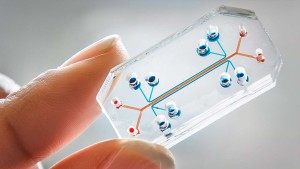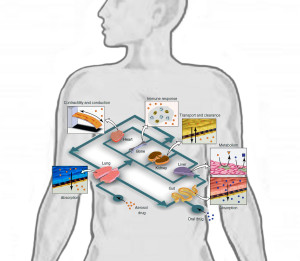 In Vitro is basically anything that is being experimented or tested on outside of the living organism in a controlled laboratory setting. When most people think about in vitro, they think of the conception method, in vitro fertilization. But what many people do not know is that it can be used as an alternative for animal testing.
In Vitro is basically anything that is being experimented or tested on outside of the living organism in a controlled laboratory setting. When most people think about in vitro, they think of the conception method, in vitro fertilization. But what many people do not know is that it can be used as an alternative for animal testing.
This is a video created by the Wyss Institute explaining their new, cutting edge technology, Organs on Chips. This is a new form of in vitro testing. They have been able to simulate human organs and their functions by using actual human cells. Currently they are working on this technology to mimic the heart, lungs, intestines, bone marrow, gut, liver and more. According to the institute’s technology development fellow, Dan Huh, they have successfully simulated a breathing lung on a small chip and tested its responses to numerous amounts of materials (00:51-01:25).
In vitro testing is going to protect animals and it is actually more effective because animal responses will differ from a human response. The organs-on-chips use actual human cells, therefore the cell response is way more efficient than testing on animals. Animals that are being used for testing have a similar make up as humans, but their responses and some parts of their anatomy that greatly differ from humans. In fact, according to the Wyss Institute in their article about Biomimetic Microsystems, they say that “animal models often fail, costing the pharmaceutical industry billions of dollars and years of time” (“Biomimetic Microsystems”). Eventually the institute hopes “to build ten different human organs-on-chips and link them together on an automated instrument to mimic the whole-body (“Organs-on-Chips”). Once they have achieved this human instrument, they will be able to possibly eradicate animal testing all together because they will have a more effective, holistic method of testing new products and medications. According to The American Anti-Vivisection Society, “rodents are more prone to cancer than humans, making them poor models for studying carcinogenicity” (Testing). In this case, using the organs-on-chips in vitro test, would be more beneficial in testing for cancer. With the strong movement to find a cure for cancer, this new technology is revolutionary.
After all the chips have been made and linked together, I believe this method should be made mandatory in United States and policy makers should make laws against harming innocent animals. It has been proven that these animal tests are less effective and are much more expensive than in vitro tests. So, why are we wasting money on tests we know are not practical? Why are collecting all of this data when it will not accurately predict what will happen in a human model?